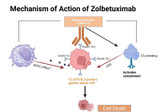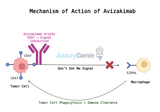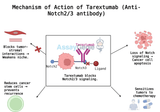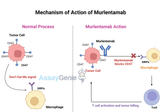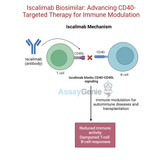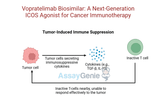Blog
Adalimumab: Mechanism, Clinical Applications, and the Role of Biosimilars
Quick Facts About AdalimumabWhat is Adalimumab?Adalimumab is a fully human monoclonal antibody designed to neutralize tumor necrosis factor-alpha (TNF-α), a key cytokine involved in inflammation.How does Adalimumab work?Adalimumab binds to TNF-α, preventing its interaction with receptors, thereby reducing inflammation and improving autoimmune disease management.What conditions does Adalimumab treat?Adalimumab is used to treat rheumatoid arthritis, psoriatic arthritis, Crohn’s disease, ulcerative colitis, plaque psoriasis, and ankylosing spondylitis.Is Adalimumab safe?Adalimumab has a well-documented safety profile but may cause side effects such as infections, injection site re
…
29th Jan 2025
Cetuximab: A Revolutionary Drug in Cancer Therapy
Quick Facts About CetuximabWhat is Cetuximab?Cetuximab is a monoclonal antibody targeting the epidermal growth factor receptor (EGFR), widely used in cancer therapy.How does Cetuximab work?Cetuximab binds to EGFR on cancer cells, inhibiting cell proliferation and inducing apoptosis, making it a powerful tool in oncology.What are the clinical uses of Cetuximab?It is commonly prescribed for metastatic colorectal cancer and squamous cell carcinoma of the head and neck, often in combination with chemotherapy or radiation.Is Cetuximab safe?Cetuximab is generally well-tolerated, but common side effects include skin rash and infusion reactions.1.) Understanding CetuximabCetuximab, a c
…
29th Jan 2025
Utomilumab: Advancing Immuno-Oncology Research
Quick Facts About UtomilumabWhat is Utomilumab?Utomilumab is a monoclonal antibody targeting 4-1BB (CD137), a co-stimulatory receptor on T-cells, designed to enhance anti-tumor immunity.What is the mechanism of action for Utomilumab?Utomilumab binds to 4-1BB, stimulating T-cell activation and proliferation while promoting an enhanced immune response against cancer cells.What are the clinical applications of Utomilumab?It has been investigated in combination therapies for cancers such as non-small cell lung cancer (NSCLC) and melanoma, aiming to improve immune checkpoint therapy outcomes.1.) Understanding UtomilumabUtomilumab represents a pivotal development in immuno-oncology a
…
29th Jan 2025
Bersanlimab: Revolutionizing Cancer Research with Anti-CD47 Therapeutics
What You Need to Know About BersanlimabWhat is Bersanlimab?Bersanlimab is a cutting-edge anti-CD47 monoclonal antibody designed to disrupt cancer cells' evasion of immune detection.What role does Bersanlimab play in targeting CD47?It inhibits CD47—a “do not eat me” signal used by cancer cells—to enhance macrophage-mediated phagocytosis and immune response.What are the clinical applications of Bersanlimab?Bersanlimab is under investigation for treating hematologic malignancies and solid tumors by restoring the immune system’s ability to fight cancer effectively.1.) Understanding BersanlimabBersanlimab represents a significant advancement in immuno-oncology, specifically within t
…
29th Jan 2025
Labetuzumab: Revolutionizing Cancer Research with Targeted Therapies
Quick Facts About LabetuzumabWhat is Labetuzumab?Labetuzumab is a monoclonal antibody targeting CEACAM5, a protein overexpressed in various cancers, primarily colorectal carcinoma.How does Labetuzumab work?By binding to CEACAM5, Labetuzumab delivers cytotoxic agents directly to cancer cells, minimizing damage to healthy tissue.What are its clinical applications?Labetuzumab is primarily used in cancer treatment research, including colorectal cancer and other CEACAM5-positive malignancies.Is Labetuzumab discontinued?Some variants, like Labetuzumab govitecan, have been discontinued, but they remain vital in understanding targeted drug design.1.) Understanding LabetuzumabLabetuzuma
…
29th Jan 2025
Enapotamab: Advancing Cancer Research with Innovative Therapeutics
Quick Facts About EnapotamabWhat is Enapotamab?Enapotamab is an experimental antibody-drug conjugate (ADC) developed to target tumor cells selectively, offering new hope in cancer treatment.How does Enapotamab work?Enapotamab combines a monoclonal antibody with a cytotoxic agent to selectively bind to tumor-associated antigens, delivering a potent anti-cancer payload directly to cancer cells.What are the clinical applications of Enapotamab?This ADC has shown potential in treating solid tumors such as non-small cell lung cancer (NSCLC), melanoma, and head-and-neck cancers.1.) Understanding EnapotamabEnapotamab vedotin represents a groundbreaking advance in oncology therapeutics
…
29th Jan 2025
Fezakinumab: Exploring Its Mechanism and Clinical Potential
Quick Facts About FezakinumabWhat is Fezakinumab?Fezakinumab is a human IgG1-lambda monoclonal antibody that targets interleukin-22 (IL-22), a cytokine involved in inflammatory responses. What is the mechanism of action for Fezakinumab?By binding to IL-22, Fezakinumab inhibits its activity, thereby reducing inflammation associated with various diseases. What are the clinical applications of Fezakinumab?Fezakinumab has been investigated in clinical trials for conditions such as atopic dermatitis and rheumatoid arthritis. 1.) Understanding FezakinumabThe development of Fezakinumab was initiated by Wyeth Pharmaceuticals and later continued by Pfizer following their
…
29th Jan 2025
Ianalumab: Exploring Its Mechanism, Clinical Applications, and Research Potential
Quick Facts About IanalumabWhat is Ianalumab?Ianalumab is a monoclonal antibody currently being investigated for its potential in treating autoimmune diseases, particularly lupus and immune thrombocytopenia (ITP). It is developed to target and inhibit B-cell activation, a critical mechanism in autoimmune responses.What is the mechanism of action for Ianalumab?Ianalumab works by targeting and inhibiting the B-lymphocyte stimulator (BLyS), which is essential for the survival and activation of B cells. By blocking BLyS, it reduces the number of autoreactive B cells responsible for autoimmune damage.What are the clinical applications of Ianalumab?Ianalumab has shown promise in trea
…
28th Jan 2025
Belimumab: Unveiling Its Role in Lupus and Beyond
Quick Facts About BelimumabWhat is Belimumab?Belimumab is a monoclonal antibody used to treat systemic lupus erythematosus (SLE), an autoimmune disease. It is marketed under the brand name Benlysta.What is the mechanism of action for Belimumab?Belimumab works by inhibiting the B-lymphocyte stimulator (BLyS), a protein that plays a central role in the survival and activity of B cells, which are involved in autoimmune responses.What are the clinical applications of Belimumab?Belimumab is primarily used to treat lupus, including lupus nephritis, by reducing disease activity and flares in patients with systemic lupus erythematosus.1.) Understanding BelimumabBelimumab, sold under th
…
28th Jan 2025
Onvatilimab: Redefining the Role of Anti-CD47 in Cancer Research
Quick Facts About OnvatilimabWhat is Onvatilimab?Onvatilimab is a monoclonal antibody targeting CD47, often referred to as the "don't eat me" signal, which is overexpressed on many cancer cells.What role does Onvatilimab play in targeting CD47?By blocking CD47, Onvatilimab enables macrophages and the immune system to recognize and eliminate cancer cells effectively.Is Onvatilimab safe?Ongoing clinical trials indicate a promising safety profile, but research is still exploring long-term effects and combination therapies.1.) Understanding OnvatilimabOnvatilimab represents a groundbreaking advancement in the field of immuno-oncology, offering a promising therapeutic strategy for c
…
27th Jan 2025
Zolbetuximab: A Breakthrough in Targeting Claudin 18.2 for Cancer Treatment
Quick Facts About ZolbetuximabWhat is Zolbetuximab?Zolbetuximab is a monoclonal antibody that targets Claudin 18.2, a protein overexpressed in gastric and pancreatic cancers, enhancing targeted therapy.What is the mechanism of action for Zolbetuximab?It binds to Claudin 18.2, triggering antibody-dependent cellular cytotoxicity (ADCC) and complement-dependent cytotoxicity (CDC), leading to tumor cell death.What are the clinical applications of Zolbetuximab?It is being investigated for treating gastric and pancreatic cancers, particularly in patients with high Claudin 18.2 expression.1.) Understanding ZolbetuximabZolbetuximab is an investigational monoclonal antibody developed by
…
27th Jan 2025
Tigatuzumab: Advancing Cancer Research with Targeted Therapies
Quick Facts About TigatuzumabWhat is Tigatuzumab?Tigatuzumab is a monoclonal antibody that targets the death receptor 5 (DR5) pathway, inducing apoptosis in cancer cells.What is the mechanism of action for Tigatuzumab?Tigatuzumab binds to DR5, activating apoptotic pathways in cancer cells, making it a targeted therapy for solid tumors and hematological malignancies.What are the clinical applications of Tigatuzumab?Tigatuzumab has been investigated for treating various cancers, including non-small cell lung cancer and pancreatic cancer. Emerging research highlights its potential in combination therapies.1.) Understanding MagrolimabTigatuzumab, a fully humanized monoclonal antibo
…
23rd Jan 2025
Basiliximab: Mechanism, Clinical Applications, and Research Advancements
Quick Facts About BasiliximabWhat is Basiliximab?Basiliximab is a monoclonal antibody targeting the CD25 subunit of the IL-2 receptor, primarily used to prevent organ transplant rejection.What is the mechanism of action for Basiliximab?It inhibits IL-2 mediated T-cell activation by blocking the CD25 receptor, crucial for immune response regulation.What are the clinical applications of Basiliximab?Basiliximab is approved for use in kidney transplantation to reduce the risk of acute rejection and has emerging applications in preventing graft-versus-host disease (GVHD).1.) Understanding BasiliximabBasiliximab, known commercially as Simulect, is a chimeric monoclonal antibody desig
…
22nd Jan 2025
Tocilizumab: Advancing Therapeutics and Research with Biosimilars
What You Need to Know About TocilizumabWhat is Tocilizumab?Tocilizumab is a monoclonal antibody that targets the interleukin-6 (IL-6) receptor, widely used for managing autoimmune and inflammatory conditions.What is the mechanism of action for Tocilizumab?Tocilizumab works by inhibiting the IL-6 receptor, thereby reducing inflammation and immune response.What are the clinical applications of Tocilizumab?It is approved for conditions like rheumatoid arthritis, cytokine release syndrome (CRS), and giant cell arteritis (GCA).1.) Understanding TocilizumabTocilizumab, marketed under the brand name Actemra, is a groundbreaking biologic drug that functions as an IL-6 receptor antagoni
…
22nd Jan 2025
Avizakimab: Unveiling the Role of Anti-CD47 in Cancer Research
Quick Facts About AvizakimabWhat is Avizakimab?Avizakimab is a monoclonal antibody designed to target the CD47 protein, a key checkpoint in immune regulation, particularly in cancer therapy.What is the mechanism of action for Avizakimab?Avizakimab works by blocking the CD47 "don't eat me" signal, allowing immune cells, especially macrophages, to target and eliminate cancer cells.What are the clinical applications of Avizakimab?Avizakimab has shown promise in clinical trials for treating various cancers, including solid tumors and hematological malignancies, by enhancing immune system responses against tumor cells.1.) Understanding AvizakimabAvizakimab is an innovative monoclona
…
21st Jan 2025
Tarextumab: Unlocking the Potential of Cancer Therapeutics
Quick Facts About TarextumabWhat is Tarextumab?Tarextumab is a novel therapeutic antibody designed to target the Notch signaling pathway, which plays a crucial role in tumor progression and resistance to treatment.How does Tarextumab work?Tarextumab inhibits the Notch2/3 receptors, disrupting critical cellular communication pathways in cancer, thereby impeding tumor growth and promoting apoptosis.What are the clinical applications of Tarextumab?Tarextumab has been studied in treating pancreatic cancer, non-small cell lung cancer (NSCLC), and small cell lung cancer (SCLC), showcasing its potential in addressing treatment-resistant tumors.Is Tarextumab safe?Safety profiles from e
…
21st Jan 2025
Murlentamab: Revolutionizing Cancer Research with Targeted Therapy
Quick Facts About MurlentamabWhat is Murlentamab?Murlentamab is a novel monoclonal antibody designed to target CD47, a "don’t eat me" signal that helps cancer cells evade the immune system.What is the mechanism of action for Murlentamab?Murlentamab binds to CD47 on cancer cells, blocking its interaction with SIRPα on macrophages. This promotes phagocytosis, enabling the immune system to eliminate cancer cells more effectively.What are the clinical applications of Murlentamab?Murlentamab is primarily being explored for treating solid tumors and hematological malignancies. Emerging research suggests its potential in combination therapies for enhanced efficacy.1.) Understanding Mu
…
21st Jan 2025
Siltuximab: Exploring IL-6 Inhibition in Castleman’s Disease and Research
Quick Facts About SiltuximabWhat is Siltuximab?Siltuximab is a monoclonal antibody targeting interleukin-6 (IL-6), a cytokine involved in inflammation and immune regulation.What is the mechanism of action for Siltuximab?Siltuximab binds to IL-6, preventing it from interacting with its receptor and mitigating downstream pro-inflammatory signaling.What are the clinical applications of Siltuximab?Siltuximab is approved for treating multicentric Castleman’s disease (MCD) in patients negative for HIV and HHV-8.1.) Understanding SiltuximabWhat Makes Siltuximab Unique?Siltuximab is a chimeric monoclonal antibody specifically designed to neutralize interleukin-6 (IL-6), a pro-inflammat
…
16th Jan 2025
Sacituzumab: Exploring its Role in Cancer Research and the Rise of Biosimilars
Key Facts About SacituzumabWhat is Sacituzumab?Sacituzumab is an antibody-drug conjugate (ADC) that targets the tumor-associated antigen Trop-2, used to treat various cancers, including breast and bladder cancers.What is the mechanism of action for Sacituzumab?Sacituzumab delivers a cytotoxic agent directly to tumor cells via its Trop-2 targeting, providing targeted therapy that reduces systemic toxicity.What are the clinical applications of Sacituzumab?Sacituzumab is used in treating advanced triple-negative breast cancer (TNBC) and urothelial carcinoma. Ongoing studies are exploring its efficacy in other cancers, including brain metastasis.Is Sacituzumab safe?While generally
…
16th Jan 2025
Ipilimumab and Nivolumab: Advancing Research on CTLA-4 in Cancer Therapy
What You Need to Know About IpilimumabWhat is Ipilimumab?Ipilimumab is a monoclonal antibody that targets CTLA-4, a protein involved in downregulating the immune system, to boost the body's immune response against cancer cells.How does Ipilimumab work?By inhibiting CTLA-4, ipilimumab enhances T-cell activation and proliferation, enabling a stronger immune response to attack tumors.What are the side effects of Ipilimumab?Common side effects include fatigue, diarrhea, rash, and more severe immune-related adverse events like colitis and hepatitis.What is the role of Ipilimumab in combination with Nivolumab?The combination of ipilimumab and nivolumab has shown enhanced efficacy in
…
16th Jan 2025
Amatuximab: Exploring Mesothelin-Targeted Therapy for Cancer Research
What You Need to Know About AmatuximabIs Amatuximab safe?Amatuximab has shown a manageable safety profile in clinical trials, with most side effects being mild to moderate. Severe adverse reactions have been rare but should be closely monitored in clinical settings.What is Amatuximab used for?Amatuximab targets mesothelin, a protein overexpressed in certain cancers, including mesothelioma and ovarian cancer. It is used in research to study its therapeutic potential in treating these malignancies.What role does Amatuximab play in mesothelioma treatment?Amatuximab has been evaluated in mesothelioma due to its ability to bind to mesothelin, potentially disrupting tumor growth and
…
15th Jan 2025
Iscalimab: Advancing Research in Autoimmune Diseases and Transplantation
What You Need to Know About IscalimabWhat is Iscalimab?Iscalimab (CFZ533) is a monoclonal antibody targeting CD40, a key protein involved in immune system regulation.What is the mechanism of action for Iscalimab?Iscalimab blocks the CD40-CD40L pathway, preventing the activation of T cells and B cells, which are central to autoimmune responses and transplant rejection.What are the clinical applications of Iscalimab?Iscalimab is under investigation for treating autoimmune diseases like Sjögren's syndrome, lupus nephritis, and for improving outcomes in organ transplantation.1.) Understanding IscalimabIscalimab (CFZ533) is an innovative monoclonal antibody developed by Novartis to
…
15th Jan 2025
Ifabotuzumab: Exploring the Role of Anti-EphA3 in Cancer Research
What You Need to Know About IfabotuzumabWhat is Ifabotuzumab?Ifabotuzumab is a monoclonal antibody targeting EphA3, a receptor tyrosine kinase overexpressed in certain cancers. It plays a critical role in tumor angiogenesis and microenvironment regulation.What is the mechanism of action for Ifabotuzumab?Ifabotuzumab binds to EphA3, disrupting tumor-supportive interactions and potentially reducing tumor growth and spread.What are the clinical applications of Ifabotuzumab?This antibody is being studied for its therapeutic potential in treating various cancers, including glioblastoma and solid tumors.1.) Understanding IfabotuzumabIfabotuzumab is a humanized monoclonal antibody des
…
15th Jan 2025
Vopratelimab: Unlocking the Potential of ICOS in Cancer Research
What You Need to Know About VopratelimabWhat is Vopratelimab?Vopratelimab is an experimental monoclonal antibody that targets the Inducible T-cell CO-Stimulator (ICOS) protein, playing a pivotal role in enhancing immune system activity against cancer.What is the mechanism of action for Vopratelimab?Vopratelimab activates ICOS on T-cells, boosting their proliferation and effector functions, which are crucial for mounting an effective anti-tumor immune response.What are the clinical applications of Vopratelimab?Emerging studies suggest that Vopratelimab holds promise in cancer immunotherapy, particularly for solid tumors like non-small cell lung cancer (NSCLC) and head and neck s
…
15th Jan 2025











